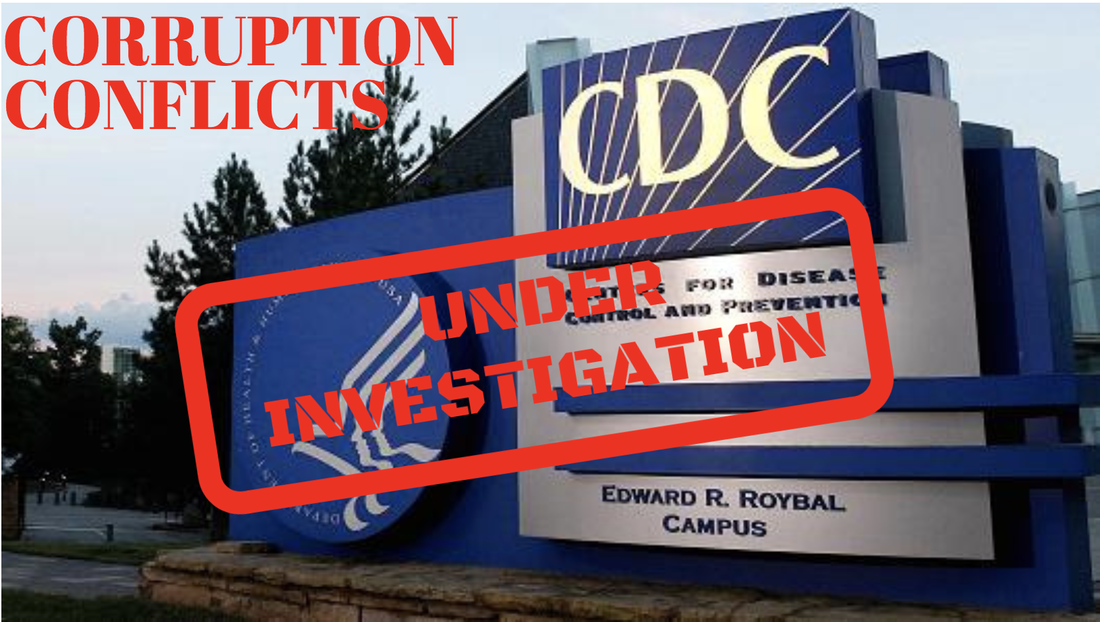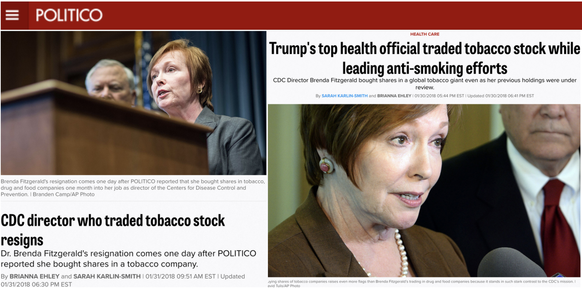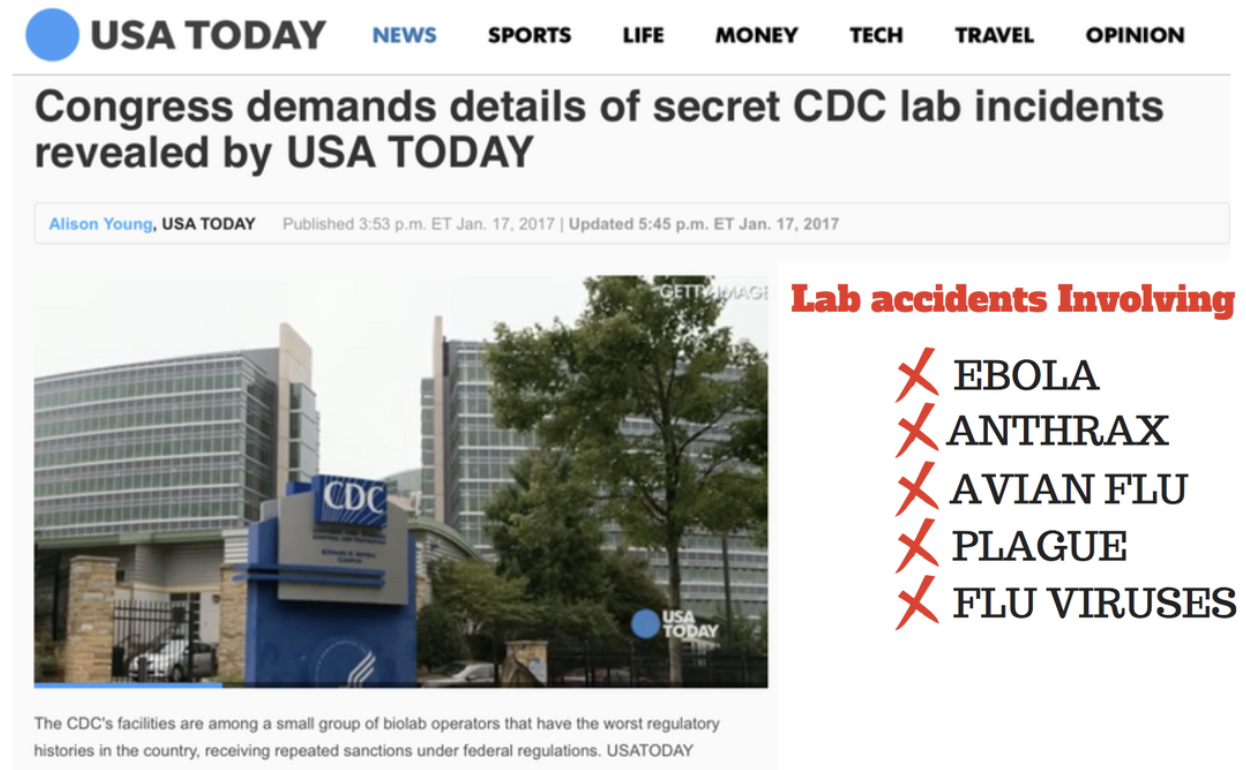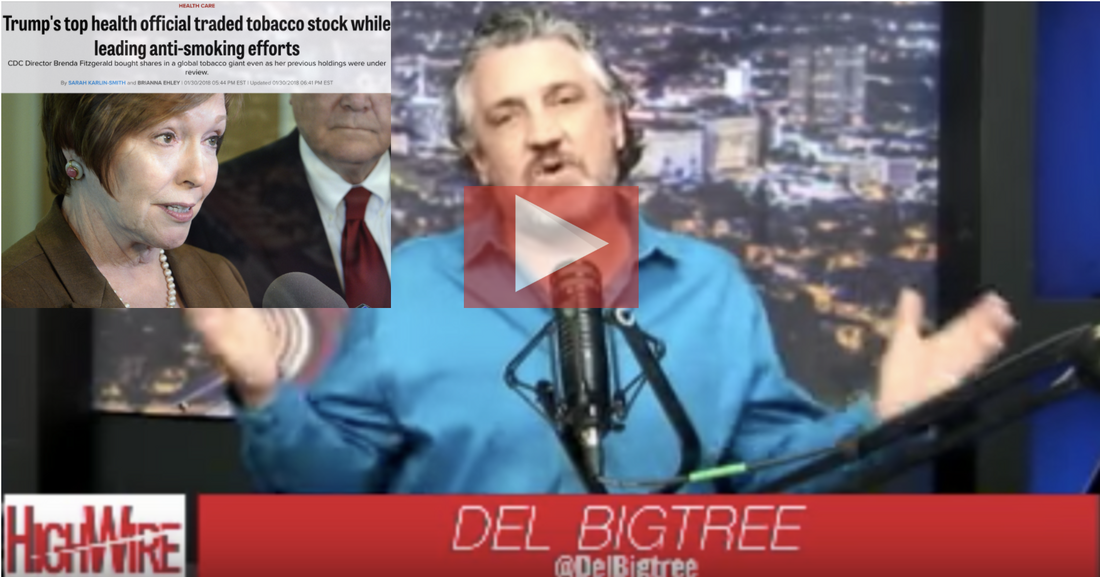When corruption reaches certain heights corporate media can no longer ignore it. Such heights were just reached with the announcement across most major media outlets that the director of the US Centers for Disease Control and Prevention (CDC) resigned over conflicts of interest.
The CDC has operated as a publicly captured agency by Big Pharma for nearly two decades. From 2002-2009 Julie Gerberding resided as director of the agency where she aggressively reshuffled personnel to stack the agency with Big Pharma influencers. She also actively shut down the CDC’s pinnacle scientific research into autism by backing the alleged destruction of information by multiple CDC scientists as told by Dr. William Thompson know now as the CDC Whistleblower. Gerberding rode the revolving door to slide directly into head Merck's vaccine division accepting a lucrative contract and stock package.
On January 30 the news outlet Politico.com ran their original investigative story into CDC director Brenda Fitzgerald’s investment holdings and the conflicts of interest they represented. Twenty-four hours later, Fitzgerald announced that she was resigning. The emphasis of Politico’s story, and all other corporate media outlets that picked it up, shied away from the vaccine corruption within the CDC embodied by its now former director. What did Politico expose? There are several bombshell components to their investigation.
The CDC has operated as a publicly captured agency by Big Pharma for nearly two decades. From 2002-2009 Julie Gerberding resided as director of the agency where she aggressively reshuffled personnel to stack the agency with Big Pharma influencers. She also actively shut down the CDC’s pinnacle scientific research into autism by backing the alleged destruction of information by multiple CDC scientists as told by Dr. William Thompson know now as the CDC Whistleblower. Gerberding rode the revolving door to slide directly into head Merck's vaccine division accepting a lucrative contract and stock package.
On January 30 the news outlet Politico.com ran their original investigative story into CDC director Brenda Fitzgerald’s investment holdings and the conflicts of interest they represented. Twenty-four hours later, Fitzgerald announced that she was resigning. The emphasis of Politico’s story, and all other corporate media outlets that picked it up, shied away from the vaccine corruption within the CDC embodied by its now former director. What did Politico expose? There are several bombshell components to their investigation.
#1 Although the majority of the headlines focused on Fitzgerald’s financial conflicts with tobacco companies, the larger story was her financial positions with Merck, one of the world's largest vaccine makers. According to Politico, Fitzgerald purchased Merck stock in the range of $1,000 to $15,000 after she was appointed to CDC director in July 2017. Meanwhile, during her short time at the CDC, Fitzgerald participated in meetings related to Zika, Ebola, and polio according to her schedule between August 1 and October 27. Merck is currently in the final stages of developing the world’s first Ebola vaccine set to be released this year. The CDC is one of the world’s go-to agencies for both guidance and monitoring during Ebola outbreaks. Once the Merck vaccine is available, the CDC and Fitzgerald would have been in a position to order vaccination of Americans if they decided. A decision that the rest of the world would most likely follow in the case of an Ebola outbreak, real or manufactured.
#2 Fitzgerald waited for a full two months after she started as CDC director before entering into a formal ethics agreement with the US Department of Health and Human Services (HHS). In October, Fitzgerald had to cancel her first scheduled appearance before Congress on the opioid epidemic because she had not finished shedding financial assets that posed a conflict of interest. Sen. Patty Murray (Wash.), the top Democrat on the Senate committee that oversees public health, complained that Fitzgerald has, on three separate occasions, sent deputies rather than appear herself to testify on the federal response to the opioid crisis at congressional hearings alongside the heads of other government agencies. In just 2016 alone, the American opioids crisis has killed more people than all American soldiers in the combined twenty years of the Vietnam war. Many have questioned why HHS and the CDC would appoint someone who had significant parts of a director job that they were unable to do, and where there was no visibility as to how long that situation would persist.
#3 A month after taking office, Fitzgerald bought stock in Japan Tobacco, one of the largest such companies in the world, which sells four tobacco brands in the US through a subsidiary. One day after her purchase, she toured the CDC’s Tobacco Laboratory, which researches how the chemicals in tobacco harm human health. Fitzgerald listed tobacco cessation as one of her primary priorities while serving in her previous position as Commissioner of the Georgia Department of Public Health. Politico.com writes, “Prior to accepting the CDC position, she owned stock in five other tobacco companies: Reynolds American, British American Tobacco, Imperial Brands, Phillip Morris International, and Altria Group Inc. – all legal under Georgia’s ethics rules. HHS did not respond to questions about why she invested in tobacco companies while working to reduce tobacco consumption.”
Is Big Pharma’s revolving door infection only present at the CDC? HHS oversees the CDC and is responsible for the safety and oversight of the US vaccination program and its vaccine schedule. An overwhelming majority of the current CDC schedule is comprised of vaccines with improper and highly unscientific pre-licensure safety testing. Recently, the Senate confirmed the nomination of former drug company executive Alex Azar as the new secretary of HHS. Azar previously ended a five-year stint as president of the US division of pharmaceutical giant Eli Lilly and Co and is now being tasked with lowering drug prices, tackling a runaway opioid crisis, overseeing the massive Medicare and Medicaid health coverage systems, and reigning in a failed, predatory vaccine paradigm hollowing out the health and vitality of America.
#2 Fitzgerald waited for a full two months after she started as CDC director before entering into a formal ethics agreement with the US Department of Health and Human Services (HHS). In October, Fitzgerald had to cancel her first scheduled appearance before Congress on the opioid epidemic because she had not finished shedding financial assets that posed a conflict of interest. Sen. Patty Murray (Wash.), the top Democrat on the Senate committee that oversees public health, complained that Fitzgerald has, on three separate occasions, sent deputies rather than appear herself to testify on the federal response to the opioid crisis at congressional hearings alongside the heads of other government agencies. In just 2016 alone, the American opioids crisis has killed more people than all American soldiers in the combined twenty years of the Vietnam war. Many have questioned why HHS and the CDC would appoint someone who had significant parts of a director job that they were unable to do, and where there was no visibility as to how long that situation would persist.
#3 A month after taking office, Fitzgerald bought stock in Japan Tobacco, one of the largest such companies in the world, which sells four tobacco brands in the US through a subsidiary. One day after her purchase, she toured the CDC’s Tobacco Laboratory, which researches how the chemicals in tobacco harm human health. Fitzgerald listed tobacco cessation as one of her primary priorities while serving in her previous position as Commissioner of the Georgia Department of Public Health. Politico.com writes, “Prior to accepting the CDC position, she owned stock in five other tobacco companies: Reynolds American, British American Tobacco, Imperial Brands, Phillip Morris International, and Altria Group Inc. – all legal under Georgia’s ethics rules. HHS did not respond to questions about why she invested in tobacco companies while working to reduce tobacco consumption.”
Is Big Pharma’s revolving door infection only present at the CDC? HHS oversees the CDC and is responsible for the safety and oversight of the US vaccination program and its vaccine schedule. An overwhelming majority of the current CDC schedule is comprised of vaccines with improper and highly unscientific pre-licensure safety testing. Recently, the Senate confirmed the nomination of former drug company executive Alex Azar as the new secretary of HHS. Azar previously ended a five-year stint as president of the US division of pharmaceutical giant Eli Lilly and Co and is now being tasked with lowering drug prices, tackling a runaway opioid crisis, overseeing the massive Medicare and Medicaid health coverage systems, and reigning in a failed, predatory vaccine paradigm hollowing out the health and vitality of America.
|
Also recently reported, original investigation by USA Today by way of Freedom of Information requests uncovered unreported lab accidents at the CDC and was met with censorship from the agency.
USA Today reports: |
"...after taking nearly two years to release the reports about incidents that occurred from 2013 to 2015, the CDC blacked out large swaths of information when accidents involved particularly dangerous pathogens, such as anthrax, Ebola and certain deadly strains of influenza."
The CDC's poor response immediately triggered a letter by leaders of the House Committee on Energy and Commerce and Subcommittee on Oversight and Investigation demanding the agency hand over the full, unredacted 503 pages of documents the CDC provided to USA Today. The congressional letter is also requesting the CDC produce "...all instances of lab safety incidents at the CDC since January 1, 2012."
The CDC's poor response immediately triggered a letter by leaders of the House Committee on Energy and Commerce and Subcommittee on Oversight and Investigation demanding the agency hand over the full, unredacted 503 pages of documents the CDC provided to USA Today. The congressional letter is also requesting the CDC produce "...all instances of lab safety incidents at the CDC since January 1, 2012."
We have entered a new page in modern American history where media and true investigative journalism is regaining the initiative and power to expose corruption within government and effect rapid change. The past and present actions of those within the CDC are not public health issues, are not political issues, and have little to do with disease prevention. The agency’s historic failures are a bellwether signaling the final stages of collapse and the predictable end to long-standing, multilevel conflicts of interest within a federal agency who has long-since abandoned its original mission to guard the health of a nation.








 RSS Feed
RSS Feed